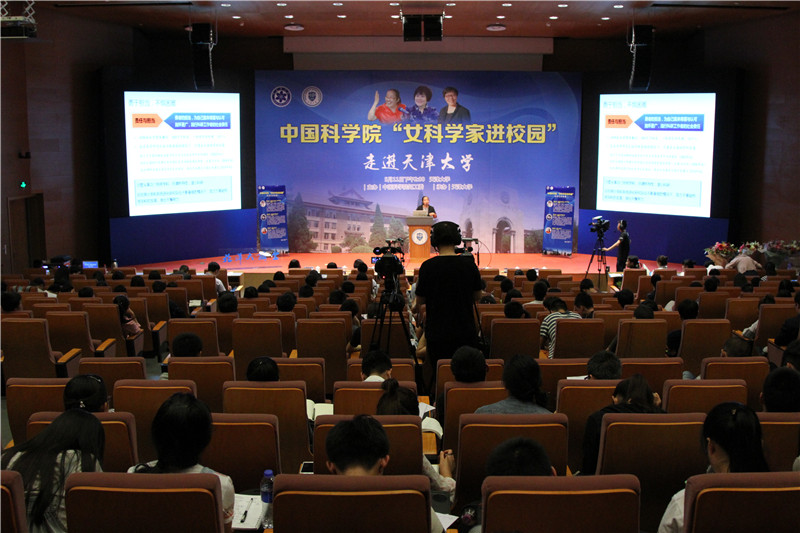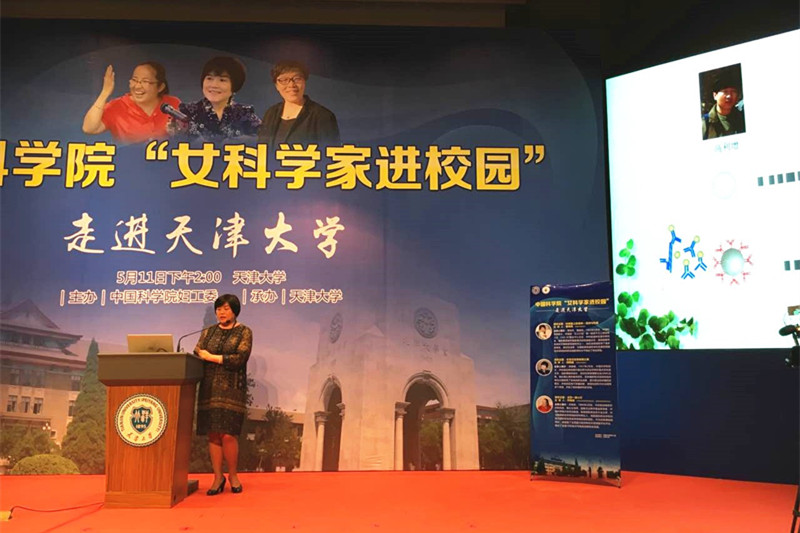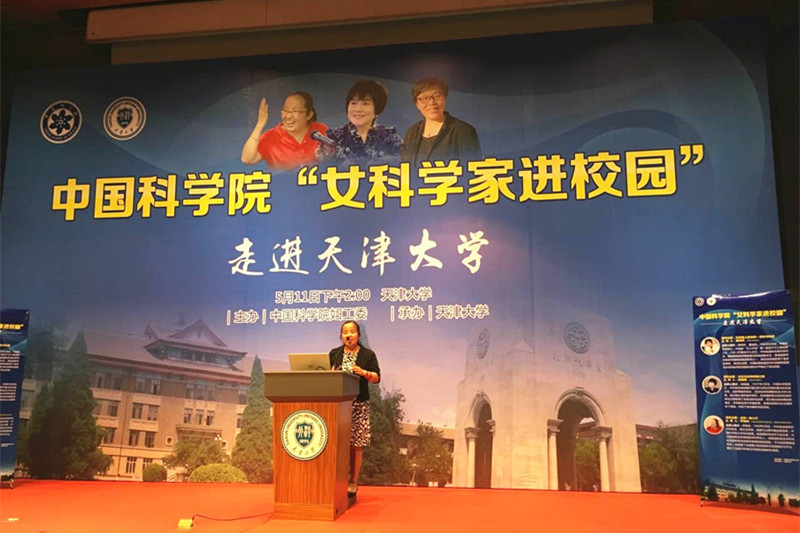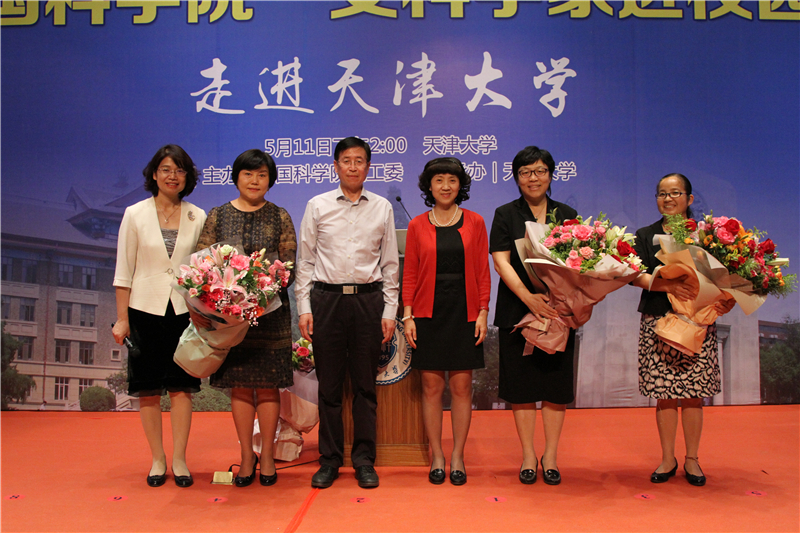Three female scientists, Cao Xiaofeng, Yan Xiyun and Qiao Gexia, from the Chinese Academy of Science, were invited to Tianjin University to share their research and life experience as women in a traditionally male-dominated field in Zhengdong Library, Peiyang Park Campus recently. Attendees included Li Jiajun the party secretary of Tianjin University, Lei Ming the deputy party secretary of Tianjin University, Li Jing the director of the Working Committee on Women of the Chinese Academy of Science, as well as faculty members and students.

They are all experts in biology. Over the past year, they, as women, whose traditional roles in China are helping their husband and instructing their children, have persisted in their scientific dreams and made great breakthroughs in their research whilst also taking care of their families. “Women should strengthen their self-confidence, independence and self-improvement” Cao Xiaofeng emphasized when she was talking about her success in research and family.

Cao is an academician of the Chinese Academy of Science, a researcher at the Institute of Genetics and Developmental Biology in the Chinese Academy of Science, and the deputy director of State Key Laboratory of Plant Genomics.
As Cao shared her experience, she summarized it as “choices and challenges”. Three big choices were made in her early life, including the choices of pursuing postgraduate education or getting a job, career or family, and staying at UCLA or returning to China.
The first choice came to her when she graduated from Peking University in 1988, when the salary of a worker was three times higher than that of a postgraduate. Given her interest in biology, Cao gave up the offer of work and dedicated herself to her research on animals. Later, she changed her research direction and started to analyze plants. “This is also an important choice I have made in my life, and it has proved to be the right one.” Cao said, “After that, I came to realize that people should concentrate on that they are not only interested in but also they are skilled in.”
In 1996, after spending one year working as a visiting scholar at the John Innes Center in England, Cao went to Washington State University for her postdoctoral education as well as a reunion with her husband. “This was the second choice. Since I wanted to continue my career and to be with my husband, I followed him and went to the US.” During their years in the US, she was bent on her research and published 12 articles in leading scientific journals, including Science and Nature. What’s more, she gave birth to her second child, which added more happiness and joy to her family. She made the third choice after she finished her studies in the US, that is, to return to China.
Looking back on her experience, Cao was grateful that she had gained so much support from her family, friends and colleagues. It was them that helped her to balance life and career and gave her constant support. In the end, she stressed the significance of rigor and morality in scientific research and gave advice to students regarding their studies.

There are several roles of the other academician of the Chinese Academy of Science Yan Xiyun, for example, the researcher at the Institute of Biophysics in the Chinese Academy of Science, the deputy director of the National Laboratory of Biomacromolecules, the secretary-general of the Biophysical Society of China, which strongly attest to her deep commitment to science.
Yan introduced three secrets of her life: self-improvement, self-confidence and freedom, in her opinion, that’s the reasons why many women became successful and popular. She said that women scientists are not geniuses but ordinary people who had to improve themselves step by step and that she was an example.
In the 1970s, she became a worker in an auto parts assembly plant after she graduated from high school. In 1977, she gained admission to a university, which became a turning point in her life. From the 1980s, when she published her first article, to now, she thought she had experienced three phases in scientific research: imitating others’ research methods, following trends and doing research on hot topics, and finally innovating in areas she was interested in.
During this process, she obtained self-improvement and self-confidence, and, the most important, she felt free in research. “When doing scientific research, I’m free to dig out all possibilities and make my own time schedule, which is very enjoyable” Yan said. She wished that more people would love science, love life and love beauty.

Qiao Gexia, known as “Daxia” or “a chivalrous woman”, performed well both in science and administration as the deputy director at the Institute of Zoology in the Chinese Academy of Science, the director of the National Zoological Museum and the recipient of the National Science Fund for Distinguished Young Scholars.
Qiao focused on her multiple roles in life. She is a scientist, a manager, a wife and a mother.
As a scientist, since she got her doctoral degree from the Institute of Zoology in the Chinese Academy of Science in 1996, she has devoted herself to her studies on aphids and completed systematical research on them. As a manager, she is responsible for the management of the National Zoological Museum. Through the efforts of her team, more than 10 million specimens of animals in China have been collected and displayed in the National Zoological Museum. As a wife, she is a good cook who makes noodles for her family every day because they are from Shaanxi province and are used to eating handmade noodles. And, as a mother, she is concerned for her child’s development.
Shuttling between these roles, she felt both happy and challenged. In her life, Qiao was inspired to maintain a peaceful state of mind and keep a balanced mood.

By: Zhao Han
Photo: Zhao Han and Tang Meng
Editors: Qin Mian and Christopher Peter Clarke






